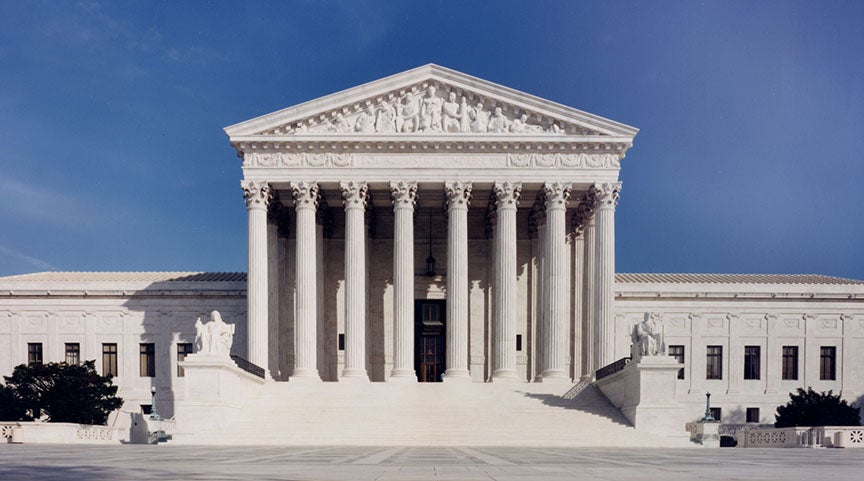The Supreme Court is expected to overturn Roe v. Wade. Here’s what you need to know.
Published 3:00 pm Wednesday, May 4, 2022
On Monday, Politico released a leaked draft opinion by Justice Samuel Alito which indicated the U.S. Supreme Court is ready to overturn Roe v. Wade, potentially ending the right to abortion in the United States and setting the stage for the procedure to become illegal in Mississippi and many other states. On Tuesday, Chief Justice John Roberts confirmed the authenticity of the document but said it does not represent the Court’s final position.
The justices’ votes could change, but if a similar opinion were ultimately adopted by the Court, it would overturn a nearly 50-year-old precedent upholding the right to an abortion in the United States. In Mississippi, a trigger law banning abortion in almost all cases would take effect soon after such a ruling.
“We hold that Roe and Casey must be overruled,” Alito wrote in the draft, dated Feb. 10. “The Constitution makes no reference to abortion, and no such right is implicitly protected by any constitutional provision.”
Below, Mississippi Today has compiled answers to some commonly asked questions about the case.
Q: The U.S. Supreme Court has voted privately to overturn Roe v. Wade. What does this mean?
A: In December, the Court held oral arguments in Dobbs v. Jackson Women’s Health Organization. Mississippi asked the Court to overturn Roe, while Jackson Women’s Health Organization — the state’s only abortion clinic — asked the justices to reaffirm previous rulings supporting the right to abortion. Shortly after oral arguments in every case, the justices have a meeting called a conference in which they each discuss their stance. Politico reported that at the conference after Dobbs v. Jackson, Alito and four other Republican-appointed justices voted to overturn Roe.
When the chief justice is in the majority, he assigns a colleague (or picks himself) to write the opinion. When he is not, the senior-most justice assigns the case. According to the leaked draft opinion, Alito was assigned to write for the majority to overturn Roe.
Q: If the leaked document is a “draft majority opinion,” is the court’s decision final?
A: No. The justices often complete many rounds of revisions before finalizing an opinion, especially in controversial cases. The author of an opinion may seek to make changes that could bring a colleague on board so that the final ruling has broader support, or they can make tweaks at the direction of a fellow member of the majority. Both the text of the opinion and the alignment of the votes could change, and on Tuesday, Chief Justice John Roberts said the leaked draft did not represent the Court’s final position.
Q: When can we expect the Supreme Court to make a decision, then?
A: The Court generally releases rulings on more controversial cases late in its term, which is set to end in June. Most court-watchers expect a ruling in Dobbs by late June, though it could come before then.
Q: What law is at the center of the case?
A: A 2018 Mississippi law that prohibited abortions after 15 weeks of pregnancy, called the Gestational Age Act. This law permitted abortions after 15 weeks only in cases of medical emergency or “severe fetal abnormality.” The law was a direct challenge to Supreme Court precedent because previous rulings have upheld the right to an abortion up until fetal viability — generally at about 24 weeks of pregnancy — when the fetus can survive outside of the womb. The U.S. Court of Appeals for the Fifth Circuit in New Orleans found the Mississippi law unconstitutional, and it has never taken effect. Mississippi asked the Supreme Court to overturn Roe to uphold the 15-week ban.
Q: Is abortion currently legal in Mississippi?
A: Yes. Abortion is currently legal up to 20 weeks of pregnancy in Mississippi. The clinic at the center of the Supreme Court’s ruling, the Jackson Women’s Health Organization, provides abortions up to 16 weeks of pregnancy. About 2,600 abortions were provided in the state in 2017, according to the Guttmacher Institute. Unless the Supreme Court formally issues an opinion overturning Roe, it remains the law of the land.
Q: Can I get abortion pills in Mississippi?
Yes. Jackson Women’s Health Organization offers medication abortions up to 11 weeks of pregnancy. Medication abortions account for seventy percent of all abortions in Mississippi. The process involves multiple pills with two kinds of medication, Mifepristone and Misoprostol, which cause a pregnancy to stop growing and trigger cramping and bleeding, similar to a miscarriage. The Food and Drug Administration permits medication abortions to be provided through telemedicine, but Mississippi bans that practice, so patients must visit a provider in person.
Q: If Roe is overturned, what does that mean in Mississippi?
A: Mississippi is one of 13 states with a “trigger law,” meaning abortion would become almost immediately illegal in almost all cases if Roe is overturned. The law allows abortions only “where necessary for the preservation of the mother’s life or where the pregnancy was caused by rape.” It does not mention incest and specifies that the exemption for rape applies “only if a formal charge of rape has been filed with an appropriate law enforcement official.” Passed in 2007, the law takes effect only if the Attorney General of Mississippi determines that the Supreme Court has overturned Roe and would likely not find the ban unconstitutional.
Q: If the court does overturn Roe, is abortion illegal across the United States?
A: No. If the Court overturns Roe, there is no right to abortion in the United States, so states are free to restrict and ban it. But states can also keep it legal, and about 20 Democratic-controlled states have taken steps to protect abortion in state law. With almost every southern state set to restrict abortion if Roe is overturned, Mississippi reproductive rights advocates believe southern Illinois could become the closest destination for Mississippians seeking abortions.
Q: What did Roe v. Wade establish?
A: Roe v. Wade established a constitutional right to abortion. The Supreme Court found in a 7-2 opinion that the Due Process Clause of the 14th Amendment contained an inherent “right to privacy” that protects a person’s right to choose abortion. The Court ruled that abortion could not be restricted during the first trimester and that during the second trimester the state could intervene only to protect the mother’s health. During the third trimester, states could pass restrictions but must always include an exemption to protect the life of the mother.
Q: What did Planned Parenthood v. Casey establish?
A: By the 1980s, the anti-abortion movement was mounting challenges to abortion access around the country. In Pennsylvania, lawmakers passed a series of restrictions, including a requirement that married women notify their husbands of a planned abortion and a 24-hour waiting period. Planned Parenthood sued over the rules and asked the Court to determine whether they violated Roe. In its 1992 ruling, the Court reaffirmed Roe but also upheld all of Pennsylvania’s rules (except the requirement that women notify their husbands), opening the door to a new wave of abortion restrictions across the country. The Court established a new principle that restrictions on abortion are permitted so long as they do not impose an “undue burden” on someone seeking the procedure before fetal viability.
Q: How is Dr. Dobbs involved?
A: The case is named for Mississippi’s state health officer, Dr. Thomas Dobbs, but that doesn’t mean he was the architect of the 15-week ban or Mississippi’s request that the Supreme Court overturn Roe. The Mississippi State Department of Health, which he leads, regulates abortion clinics, so the 15-week ban would be enforced by his department. To challenge the law, the Jackson Women’s Health Organization had to sue his agency.
Dr. Dobbs addressed this question on Twitter on April 24. “Why is the Supreme Court case named Dobbs vs Jackson Women’s Health?” he wrote. “Based on sovereign immunity protections plaintiffs must sue the head of the regulatory authority, which in this case is the State Health Officer, my current role.”
Q: In what circumstances would an abortion still be allowed in Mississippi if Roe is overturned?
A: Very few. The state’s trigger law would take effect 10 days after the state attorney general formally determined Roe had been overturned. That law allows abortions only to save “the mother’s life” or in cases of rape, but only when the rape has been reported to the police. It does not allow exceptions for incest, maternal health short of a life-threatening situation, or severe fetal abnormalities. The law also punishes people who perform abortions (“except the pregnant woman”) with one to 10 years in prison.
Q: Will this affect the availability of birth control/IUDs?
A: The short answer is no, at least not immediately. If the Court ultimately adopts Alito’s opinion or something similar, access to birth control and IUDs in Mississippi won’t be affected unless legislators pass a new law. Mississippi’s trigger law only applies to abortions, not birth control.
The longer answer is that advocates in Mississippi and around the country are concerned about what the fall of Roe would mean for contraceptive access. Opponents of abortion have sometimes sought to blur the line between that procedure, Plan B, and intrauterine devices (IUDs) — a form of long-acting birth control that prevents fertilization and thus pregnancy after sex. In Missouri, lawmakers recently tried (unsuccessfully) to redefine IUDs as “abortifacients” to stop Medicaid from paying for them.
The founders of Converge, the reproductive health nonprofit now administering Title X family planning funds in Mississippi, recently told Mississippi Today that they want to make sure Mississippians know that birth control is legal.
“If Roe is overturned, family planning care is probably next on the agenda,” co-founder Jamie Bardwell said.
By Isabelle Taft, Mississippi Today






